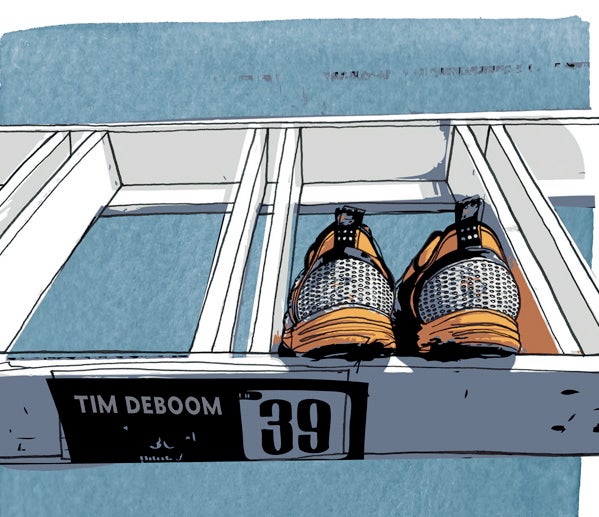Tim DeBoom: It Was Time

Illustration by Hunter King.
All signs point to moving on.
This article was originally published in the Nov/Dec 2012 issue of Inside Triathlon magazine.
I stood in the transition area holding them. I had just finished one place out of the money in an insignificant race, at the start of an insignificant 18th professional season. As I listened to my peers dissect their races, I was suddenly compelled to add some significance to the day.
I carefully and deliberately placed them back under the bike rack. I stepped away and smiled to myself, knowing I was completely alone during this momentous occasion. It was not a weighty decision that required interviews and press releases. I was well past my prime and had possibly tarnished some of my accomplishments by continuing to stand on the start line.
I stared a few more minutes. I knew it was the right decision, but I still found it hard to walk away knowing the consequences. I had been fearful of this moment for several years, and that fear had paralyzed me from committing to it.
I’m sure every person experiences it at some point, in whatever line of work they do. I’m talking about the loss of passion that inevitably leads one to just go through the motions from day to day. I had become a lazy professional triathlete. The training always came easily for me. I continue to love it today. The little things, however, the details that make a good athlete great, the things that place you in the money instead of just out of it, had become chores.
I was not as quick to consume that post-workout recovery drink, and eight hours of sleep a night had gone out the window with the birth of my daughter. I was much more inclined to grab my mountain bike and hit the trails than grab my tri bike for some intervals. And my nightly beer had become just as welcoming as my morning coffee. All the signs were very clear as I continued to look down at them.
Most of the fear in walking away was wondering what would come next. I did not have an exit strategy. I always thought that I needed one to move forward successfully, but I was beginning to feel relieved about turning away and leaving them there, even without a safety net.
I finally pulled my gaze away from them, grabbed the rest of my gear and exited the transition. There was only one person I was going to tell, and she was not there. I thought about the irony of someone calling after me to return what I forgot. Would I rethink my decision and see it as a sign I was making a mistake? No one came after me.
In truth, if I were looking for signs, there were several that seemed to reinforce my choice. As I searched for the rental car keys, my wallet fell to the ground and a laminated slip of paper dropped out. It was a note from my father I always carried with me. It read: “The only time you can be brave is when you’re afraid.” That piece of paper always gave me strength when I needed it.
I then got into the car, started up the engine and watched the race venue disappear behind me as I drove back to the hotel. Van Morrison was on the radio singing, “It’s a hard road, it’s a hard road daddy-o.” Just like me, he too was searching for “The Philosopher’s Stone.”
I was feeling satisfied with my resolution at this point. Upon entering my hotel room, one last token was thrown my way to cement the issue. I have a bad habit of leaving the television on in my room. The voice coming from it was unmistakable and comforting, and I immediately knew the movie and the precise scene playing.
“Get busy livin’ or get busy dying,” Morgan Freeman said in “The Shawshank Redemption.” I nodded my head and echoed him out loud. “That’s damned right.”
I then sat on the edge of the bed and called my wife, Nicole. She was the one who would know exactly what leaving them behind meant. Unknowingly, she inspired my action when she did it herself after failing to place in the money of a race for the first and only time in her career. She knew the timing was right, she had better things ahead of her, and she never looked back.
“How did it go?” she asked.
“I left my racing shoes in transition,” I answered. “It was time.”
Tim DeBoom is a two-time winner of the Ironman World Championship and the last American to win in Kona.